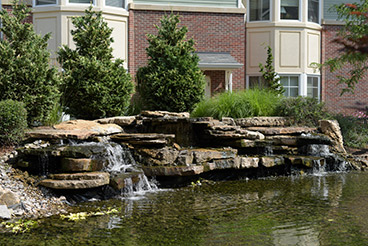 March 2020 is a time that no one will soon forget. The fundamental way people lived their lives changed overnight, as all across the world people collectively went into lockdown to prevent the spread of COVID-19. As people were urged to stay home, particular caution and care were afforded to those who were deemed especially susceptible to the virus: the immunocompromised, frontline workers, and, of course, the elderly.
March 2020 is a time that no one will soon forget. The fundamental way people lived their lives changed overnight, as all across the world people collectively went into lockdown to prevent the spread of COVID-19. As people were urged to stay home, particular caution and care were afforded to those who were deemed especially susceptible to the virus: the immunocompromised, frontline workers, and, of course, the elderly.
Health care facilities reacted swiftly to lockdown and secure their campuses in a conscious effort to protect their vulnerable populations. Nursing homes and assisted living communities have had a challenging time during the pandemic, as these facilities rely on a consistent flow of volunteers and family members visiting the residents.
Suddenly the residents found themselves cut off from the rest of the world, and these facilities had to find ways to help them adapt. They had to work to find new ways to keep their residents’ minds engaged and uplifted throughout the lockdown.
Masonic Homes Kentucky’s Louisville Campus turned to an unexpected outlet of healing and comfort during this time: Trees.
About Masonic Homes’ 82-Acre Arboretum
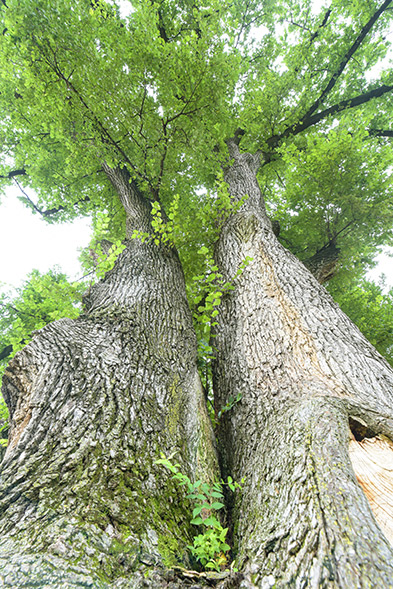 Trees and the green spaces the trees create play a massive role in the landscape for Masonic Homes Kentucky. In particular, the Louisville Campus was designed in 1927 by renowned landscape architectural firm, The Olmsted Brothers.
Trees and the green spaces the trees create play a massive role in the landscape for Masonic Homes Kentucky. In particular, the Louisville Campus was designed in 1927 by renowned landscape architectural firm, The Olmsted Brothers.
It was established by the sons of the landscape architect Frederick Law Olmsted who is best known for his work in designing the grounds of New York City’s Central Park, the U.S. Capitol in Washington, D.C., and the Biltmore Estate in North Carolina.
“Masonic has taken great care and consideration to preserve elements of the original design and to replicate it whenever possible,” says J Scott Judy, chief executive officer, Masonic Homes Kentucky.
“One of the many beauties of Kentucky is the changing of its seasons. Masonic’s parklike setting offers four miles of paved walking paths that intertwine the historic and the contemporary community buildings.”
The Masonic Homes Kentucky community hires certified professional grounds staff who are responsible for all of its three campuses, each with its own unique landscape. These professionals understand trees and green landscapes as an investment in the well-being of the residents and staff of the communities.
In addition, the Louisville Campus will soon add walking paths that will line the campus to help encourage employees and residents alike to spend more time outside.
Recognized By Arbor Day
Masonic Home Louisville is recognized as a Tree Campus Healthcare facility to highlight its dedication to trees and nature. Tree Campus Healthcare is a program of the Arbor Day Foundation, the world’s largest membership nonprofit dedicated to planting trees.
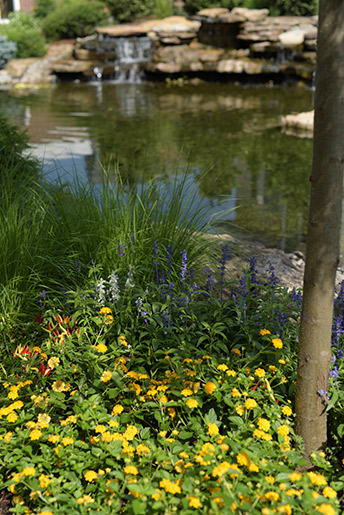 Launched in 2019, Tree Campus Healthcare is one of the newest recognition programs from the Arbor Day Foundation that aims to recognize any health care facility purposefully using trees and green spaces to promote good health and well-being for its employees and occupants.
Launched in 2019, Tree Campus Healthcare is one of the newest recognition programs from the Arbor Day Foundation that aims to recognize any health care facility purposefully using trees and green spaces to promote good health and well-being for its employees and occupants.
For Masonic Home Louisville, its designation as a Tree Campus Healthcare facility serves as an opportunity to remind its leadership to continue investing in these types of greening projects and as a general reminder for everyone of the close relationship nature can have for the care and healing of residents.
The Healing Benefits of Trees
Trees can help more than just the environment; they help with human health. Research shows that patient recovery improves when there is interaction and incorporation of green spaces, gardens, and parks. Natural areas help patients reduce stress, help restore physical health, and shorten the overall recovery process, according to R.S. Ulrich, reporting in Science magazine.
Spending time outside in hospital gardens is highly beneficial for the patient and additionally, hospital window views of natural scenes have been shown to reduce post-operative hospital stays. Having trees on a health care campus is a natural partnership.
“Outdoors is a respite for so many residents during the pandemic,” says Judy. “The vast grounds offered residents a safe sanctuary to enjoy fresh air, exercise, and beautiful scenery while allowing social distancing.”
To curb the risk of exposure during the pandemic, the facility decided to close its campus to all nonessential visitors. However, Masonic Home Louisville took a creative approach to share the beauty of its facility campus. It created a virtual landscape tour, which highlighted unique trees and interesting landscaping. The trees and green spaces served an essential purpose for the residents and staff: They provided hope during the lockdown.
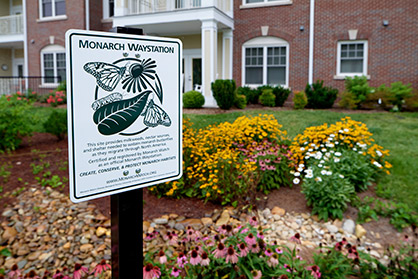 It is evident that trees are a priority for the Louisville Campus, but the community ultimately prides itself on its commitment to caring for its residents. Masonic Home Louisville is not only a Tree Campus Healthcare facility, but it is also part of the American Health Care Association/National Center for Assisted Living (AHCA/NCAL).
It is evident that trees are a priority for the Louisville Campus, but the community ultimately prides itself on its commitment to caring for its residents. Masonic Home Louisville is not only a Tree Campus Healthcare facility, but it is also part of the American Health Care Association/National Center for Assisted Living (AHCA/NCAL).
The facility enjoys being a member of the association because of the relationships cultivated and the resources provided. AHCA/NCAL’s values encouraged Masonic Homes Kentucky to rise above and beyond the regular standard of care for its residents, even if it means extra care routinely given to maintaining and cultivating the landscaping and greenery of the grounds.
Little did Masonic Home Lousiville know that this dedication and love of nature would provide a safe space, six feet apart.
Make Trees a Priority
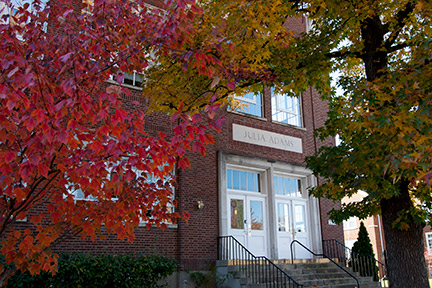 More
trees mean more benefits for everyone. Trees take care of the air,
water, and wildlife everywhere they exist. Trees are considered the
lungs of the earth because they take in carbon dioxide and release fresh
oxygen. Trees help reduce urban runoff and the amount of sediment,
pollutants, and organic matter that reach streams.
More
trees mean more benefits for everyone. Trees take care of the air,
water, and wildlife everywhere they exist. Trees are considered the
lungs of the earth because they take in carbon dioxide and release fresh
oxygen. Trees help reduce urban runoff and the amount of sediment,
pollutants, and organic matter that reach streams.
Planting trees
is also a great way to encourage local biodiversity in urban
communities. The list of good things trees accomplish can go on and on,
but the message is the same: Trees deserve to be a higher priority on
everyone’s list.
To learn more about the Arbor Day Foundation’s Tree Campus Healthcare program, go to arborday.org/programs/tree-campus-healthcare/.
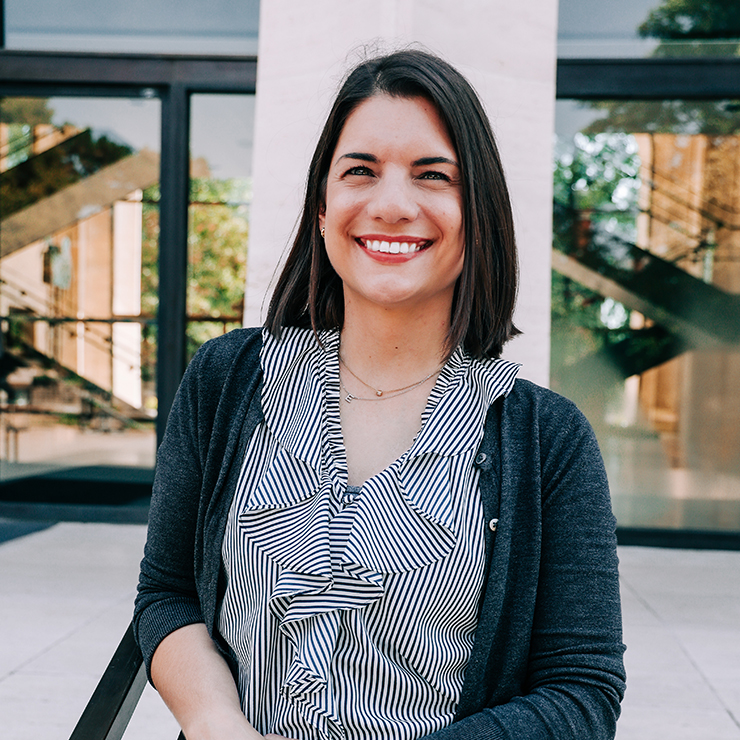 As program manager, Logan Donahoo leads the Tree Campus “family” of recognition programs at the Arbor Day Foundation, which includes Tree Campus Healthcare. In her role, she focuses on growing participation in each program, creation of resources for program participants, and cultivation of relationships with collaborating organizations and networks. Donahoo can be reached at ldonahoo@arborday.org.
As program manager, Logan Donahoo leads the Tree Campus “family” of recognition programs at the Arbor Day Foundation, which includes Tree Campus Healthcare. In her role, she focuses on growing participation in each program, creation of resources for program participants, and cultivation of relationships with collaborating organizations and networks. Donahoo can be reached at ldonahoo@arborday.org.